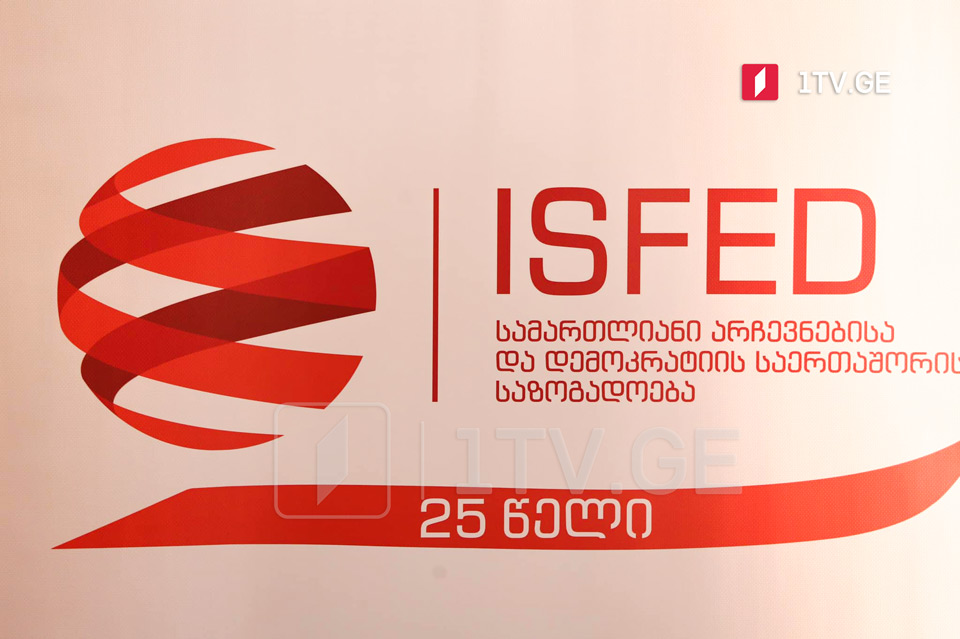
The Board of the International Society for Fair Elections and Democracy (ISFED) believes that the shortcoming in the parallel vote tabulation (PVT) is a human mistake. However, ISFED said at an official briefing today that CEO is responsible for not making this information public on time.
ISFED Board members Baia Pataraia and Tamara Sartania presented the investigation report and the board’s recommendations for future steps at a briefing held at the ISFED office.
“ISFED monitored the entire process of the October 31 parliamentary elections through long-term and short-term observers. One of the organization’s election observation tools is the Parallel Vote Tabulation (PVT), which ISFED has been conducting in all national elections since 2003. The PVT methodology involves the deployment of short-term observers at randomly selected, nationwide, representative precincts, and the processing of information received from them. The PVT methodology provides observation of the entire election day process, the detection of irregularities, and the rapid transfer of voting results to the PVT data center and processing.
On November 1, 2020, ISFED published the preliminary PVT results, which missed the results later published by the Central Election Commission (CEC) in the case of three parties. There was also a mistake in other parties’ outcome, albeit within the margin of error. ISFED internal audit revealed a technical fault in the PVT formula since invalid ballots were also counted. The percentage of votes received by the candidates after the correction changed slightly and approached the CEC results. The announcement of the updated results by ISFED on December 11 prompted additional questions from the public. In particular, ISFED impartiality, professionalism, and long-standing reputation have been called into question. Also, allegations of pressure on ISFED and its CEO were voiced. An extraordinary ISFED Board meeting was held on December 12 following the high public interest and a board member request. The board voted for creating a PTV Fault Investigation Commission.
The Commission should have investigated the causes of the alleged PVT defect during the 2020 parliamentary elections and the measures taken by the management of the organization to eliminate the problem.
The commission investigated between December 12-20. During this time, the Commission spoke with the ISFED Executive Director, Deputy Director, staff involved in the PVT process, ISFED top and middle management, as well as one of the experts from the National Democratic Institute (NDI), who was directly involved in the 2020 PVT. The commission also reviewed the organization’s documentation on the issue.
The Commission’s findings among general tabulation rules are that the SMS and incident database is being updated based on information reviewed by NDI experts and ISFED. Based on this information, for example, the formula for counting votes in a particular country is clarified, as well as the logical tasks of identifying inaccuracies in the election process (for example, imbalances in the protocols, inaccuracies in voter turnout, etc.).
The Commission found that ISFED had provided NDI experts with a written list of logical errors, although this list did not specifically contain the formula for vote tabulation in Georgia. However, the commission could not establish unequivocally whether the issue of counting invalid ballots was discussed during the oral meetings. Directly before election day, the PVT conducts election day simulations to test election day and the incident database. However, this process does not involve simulating the counting of votes received by candidates. Consequently, according to the information provided to the Commission, ISFED could not find a fault in the vote-counting formula even under the PVT testing conditions.
The Commission also considered the possibility of making changes to the PVT software in bad faith. However, the Commission has not been able to investigate a single fact that indicates this. Therefore, the Commission considers that talking about the scenario, as if the PVT data mismatch with the CEC data was pre-planned, is unfounded.
Based on the interviews and the review of the documentation, the Commission considers that the deficiency found in the vote tabulation formula is a human mistake, the responsibility for which lies equally with the ISFED PVT Coordinator / Deputy Director and the NDI Washington’s experts.
According to the Commission, the ISFED Executive Director and her Deputy only initially knew about the alleged defect.
The Commission reported that the ISFED management was aware of the need to make the technical fault known to the public, however, the announcement was postponed until the end of the audit since the shortcoming was a maximum of 1.7% and did not affect the distribution of mandates.
Later, the CEO decided to publish the final PVT results along with the interim report of the parliamentary elections. According to the CEO, she was informed on December 9 that the ruling team was manipulating the PVT results in the negotiation process with the opposition.
Also, on December 11, the media reported on the pressure on the ISFED CEO. In response, the CEO decided to publish the revised PVT results. The Commission considers that the CEO failed to consider the existing political context and did not timely inform the public about the deficiencies found in the vote tabulation formula, thus endangering the organization’s reputation and the credibility of the PVT methodology in general. At the same time, according to the information investigated by the Commission, there is no attempt to pressure or intimidate the executive director, which forced her to hide this information,” the statement reads.
ISFED spokesperson explained the parallel vote tabulation methodology at today’s briefing, noting that a Serbian PTV model was used however, NDI experts involved in the process were not informed about the model, which also counts invalid ballots.
The Executive Director of ISFED, Elene Nizharadze, resigned yesterday.
By - Svetlana Alimova








